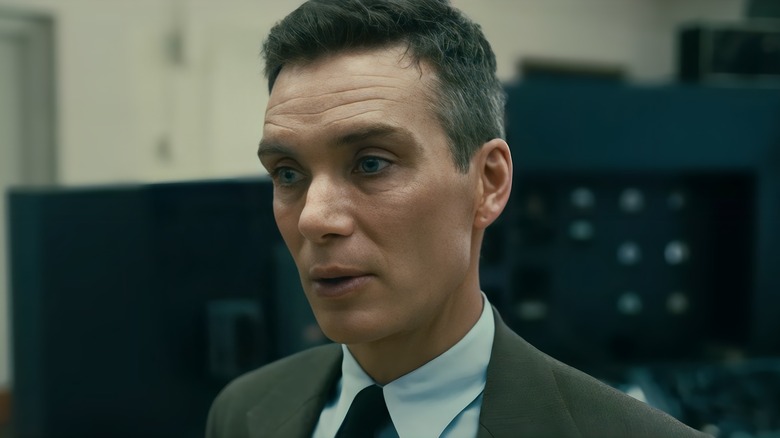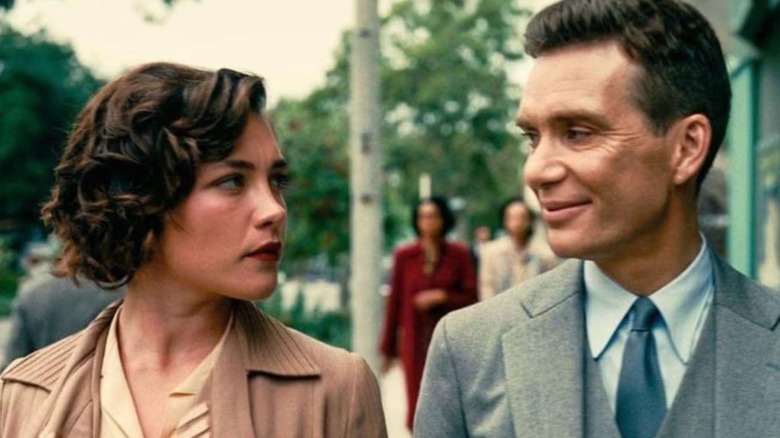Christopher Nolan's Oppenheimer Has A Similar Ending To Inception - It's Complicated
Audiences are gearing up for the next Christopher Nolan film as the legendary director prepares to release the explosive blockbuster "Oppenheimer." Ahead of its theatrical debut, Nolan revisits his past career including his mind-boggling hit "Inception." He even compares the two by likening their similar endings, which may leave audiences feeling heavy and emotionally drained.
The final sequence from "Inception" is always a fun discussion point among film enthusiasts as they embrace the enigmatic conclusion that inspires multiple interpretations. Did Cobb (Leonardo DiCaprio) truly resurface from the dream world and find his happily ever after with his kids? Or will the dream totem continue spinning forever and signal that he's really still submerged elsewhere in reality? Does Cobb even care after all he's been through? Nolan shared his thoughts with Wired, "I mean, the end of 'Inception,' it's exactly that. There is a nihilistic view of that ending, right? But also, he's moved on and is with his kids. The ambiguity is not an emotional ambiguity. It's an intellectual one for the audience."
Though "Oppenheimer" may feature a more concrete answer, it's still an unsettling finale that resembles "Inception," as Nolan continued, "It's funny, I think there is an interesting relationship between the endings of Inception and Oppenheimer to be explored. Oppenheimer's got a complicated ending. Complicated feelings." That complexity is often a trademark of Nolan's work that threads together his auteur vision from film to film, as early theatergoers have experienced with his latest release.
Both Christopher Nolan films share a bleak but complex kind of ending
"Oppenheimer," based on the startling truths revealed in the book "American Prometheus: The Triumph and Tragedy of J. Robert Oppenheimer," captures the harrowing reality of the creation of the Atom Bomb. The nuclear tool was utilized during World War II to desolate Japan's Hiroshima and Nagasaki by showcasing both the United States unrivaled power and their response to the Japanese attack on Pearl Harbor.
Christopher Nolan's new film explores the ethical boundaries crossed by the title character, who played a pivotal role in bringing the weapon of mass destruction to life. J. Robert Oppenheimer (played by Cillian Murphy) was even dubbed "the father of the atomic bomb" for his central involvement and research in the Manhattan Project.
The esteemed director reflected on audiences' first reactions with Wired stating, "Some people leave the movie absolutely devastated. They can't speak. I mean, there's an element of fear that's there in the history and there in the underpinnings. But the love of the characters, the love of the relationships, is as strong as I've ever done." That strong character development further links the comparison to "Inception," which even shares the talented Cillian Murphy among its star-studded cast.
Nolan's vision for Oppenheimer made it a complicated film to make
Leading up to the complicated, "Inception"-like ending, Christopher Nolan took a complex, fascinating approach to telling the story of "Oppenheimer." Speaking with Total Film, he shared that he set out to recall the historical events depicted in the film through J. Robert Oppenheimer's eyes, making the otherwise straightforward historical drama more personal. "We're trying to tell the story of somebody's life and their journey through personal history and larger-scale history, and so the subjectivity of the story is everything to me," he said of his vision.
Naturally, taking "Oppenheimer" in this direction changed the game — especially for Cillian Murphy. "We want to view these events through Oppenheimer's eyes. And that was the challenge for Cillian that I set him, to take us on this journey," Nolan added, noting that while Murphy did have it tough, the challenge extended to pretty much the entire team behind the movie. Every choice made had to somehow circle back to Oppenheimer's perspective and how he understands the world during such a turbulent yet pivotal point in history.
"Oppenheimer" opens on July 21.


